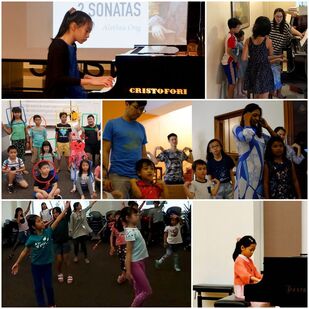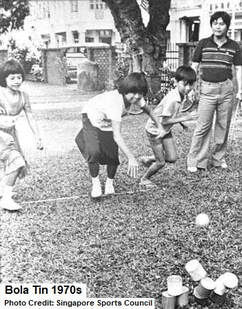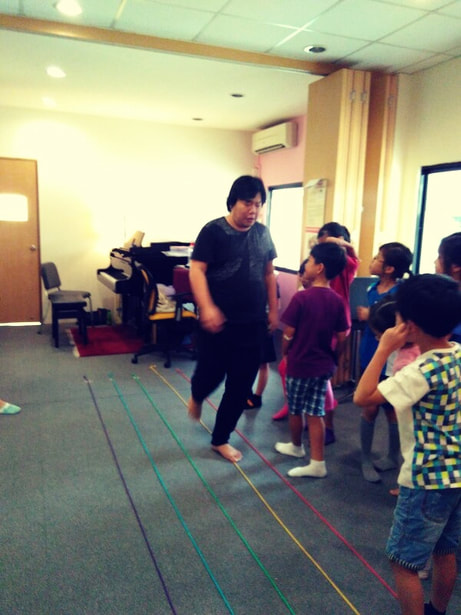 by Khoo Hui Ling I recently wrote a short essay called Three Birthday Wishes which was published in the 2019 edition of The Birthday Book: Narratives, Undiscovered and Underway in celebration of Singapore's bicentennial. Wishes are not just for birthdays though. Christmas is a season for wishes too, and this festive week, I'd like to share this essay here as a dedication to all my students past or present, whether at NUS or The Music Studios: Merry Christmas and onwards to 2020! Here goes: Are childhoods then and now very different? My parents sometimes reminisce about their childhoods. They played simple games like chapteh, hantam bola, goli and five stones with neighbours. Having many siblings meant there was always someone to play with. They recall terrifyingly strict school headmasters. Yes, they had canes! Childhood had a certain romantic innocence then. That simplicity is a Tasmanian tiger in modern lifestyles: extinct. For many families, both parents work. Many children see much more of the helper at home than they do their parents. They probably have schedules like a fondue fountain, overflowing with sports, arts and academic classes. There is an undeniable complexity in the lives of today’s children. We cannot change the inevitably morphing face of childhood. But as a music educator who has taught children and teenagers, I question how these changes are impacting them. Are we raising healthy children with beautiful hearts? In each child’s face lies a pair of twinkling eyes, alive with curiosity. Children are a reminder of the undiscovered, as easily destroyed as it is precious. This year, as we celebrate 54 years of nation building, I would love to make birthday wishes for the children of Singapore too. Just three wishes. ***
13 Comments
by Arlene Chng Many parents often ask what musicianship lessons entail. What are the differences between piano and musicianship lessons? Can’t musicianship be taught during regular piano lessons? Is musicianship essential to learning the piano? To shed some light on musicianship lessons, I decided to write a post on what a typical musicianship class is like. A Typical Musicianship Class with TMS student Charlene YuanCharlene is just turning 9 years old, and has been having weekly 45 minute musicianship lessons with me since last year. A typical lesson with her includes warm-ups, rhythmic exercises, solfege, aural training, as well as theory application.
by Khoo Hui Ling Jerison's abundance of energy as he demonstrates an exercise. About a year back, I had the pleasure of having Mr. Jerison Lee, Dalcroze Consultant at The Music Studios, conduct a private Dalcroze Eurhythmics workshop for my students. I don't think I've ever met a teacher who had such an abundance of energy. His could rival the young ones'. Needless to say, the workshop ended with the kids listening to music with new found enjoyment. I was also pleasantly surprised at how some of my students opened up and displayed confident spontaneity through Jerison's teaching.
Just a little introduction to the Dalcroze Method. It is an approach to music education whereby students learn aspects of musicianship such as solfege, improvisation, rhythm and phrasing. Students experience musical gesture via body movement. I've found that it helps nurture a natural musical instinct in students. This June, The Music Studios will be organising a Musical Arts Holiday Camp led by Jerison. In the midst of working with him, we found out so many inspiring things about him as a teacher. We hope this interview with him could unveil some colourful snippets of being a music educator. What has your musical journey been like, and how did you realize your calling to teach Dalcroze? I always loved music as a child and I started learning piano like everyone else did. When I was in primary school, I joined the concert band and that was the beginning of the exciting musical journey of my life! Basically I was hooked and I started joining choir, orchestra and chinese orchestra. I began teaching the piano when I was 17 and honestly was quite helpless. After several years of exploring, a friend introduced the Dalcroze approach and after attending a Dalcroze Conference in Japan, I decided this is it! I want to study Dalcroze. by Khoo Hui Ling
How many of us have practised whilst mulling over dinner possibilities? Or perhaps have unknowingly slid into ‘OCD’ repetition mode during a practice session? Surely we have at some point realized with a jolt that we are forgetting to listen intently to ourselves? We’ve all been there, because we are human. However, students often get lost in there, the doldrums of unfocused practising, unable to find their way out. To help students navigate out of this vicious cycle, I have to script their inner conversation. For inside each of us, there lives a little voice. We are always having conversations with this little voice. It is a way of perceiving our surroundings, a means to making decisions. Teaching students to be aware of and to use this inner conversation is the key to effective and efficient practice. How To Develop An Inner Conversation 1. Language The skilful use of concise language to teach is imperative in developing a strong inner conversation for students. Professor of Piano at the Yong Siew Toh Conservatory Thomas Hecht is a master at that. Dr. Hecht is a very dear teacher who apart from imparting enduring life lessons, also taught me how to listen and not merely hear. In a recent presentation entitled “Launching My ‘SMART’ Piano Studio”, Dr. Hecht showed how his teaching concepts have been economically abbreviated into interactive ‘apps’ which are screened onto a wall right in front of students in his studio. The Gattacca of the Yong Siew Toh Conservatory! by Khoo Hui Ling
Opening up to music, which is Part 2 of What It Means To Have A Lifelong Friendship with Music, is very much like opening up to a friend. It is about connecting emotionally with music. It is about seeking to learn and understand first before making any judgement. The former requires humility, while the latter, curiosity. Leon Fleisher, a pianist greatly revered not just for his commanding musicianship but his gentle soul, is a living embodiment of humility and curiosity. For those who may not be so acquainted with the pianist, in his mid-thirties and at the height of his performing career, Mr. Fleisher lost the use of his right hand due to focal dystonia. Resilience saw him through thirty or so years of experimental treatment, as well as a spectacular career as a teacher and conductor. Half his lifetime later in his seventies, he regained the use of his right hand and cut a CD Two Hands. Not too long ago, he celebrated his 90th birthday, performing in major music festivals. In the article “Lessons I Learned From My Dad” written for the New York classical music radio station WQXR’s blog, Julian Fleisher calls his dad, Leon Fleisher, a “badass”. I think for many of us, we can only aspire to be that bad of an ass. It is an easy and humorous read which you can explore here: https://wqxr.org/story/lessons-learned-dad-leon-fleisher-piano/. by Khoo Hui Ling
When starting The Music Studios, the dedicated team of teachers and I unanimously agreed that a lifelong friendship with music was the best gift a music teacher could give to a student. The tagline does have a nice ring to it, but what does it really entail? Since The Music Studios is a recent development and this is the very first blog post, I thought it meaningful to share some ideas about that. To all music teachers and parents, I hope this will provoke some thought into the worth behind sending children for music lessons. I’ve found “The Little Prince” by Antoine de Saint-Exupery to be an enlightening allegorical read that has inspired many facets of my life. It is about a little prince from another planet, and his encounters of adult life from a young child’s innocent perspective. The little prince learns many lessons from his love and pining for a rose from his home planet, which leads to my first point below. PART 1 - FALLING IN LOVE WITH MUSIC “People where you live," the little prince said, "grow five thousand roses in one garden... yet they don't find what they're looking for... They don't find it," I answered. And yet what they're looking for could be found in a single rose, or a little water..." Of course," I answered. And the little prince added, "But eyes are blind. You have to look with the heart.” |
AuthorsKhoo Hui Ling Archives
January 2020
Categories
All
|



